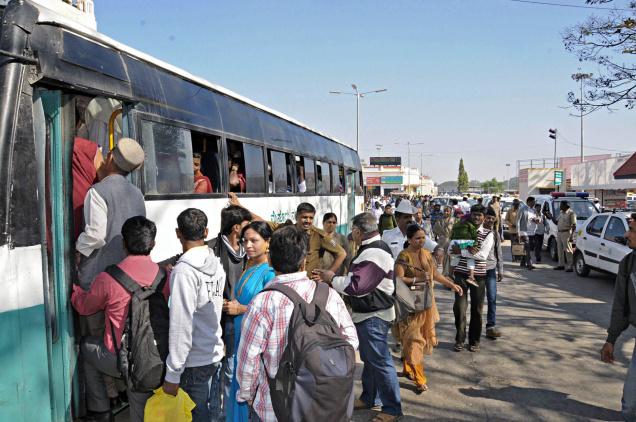MYSORE, January 7, 2014: Nearly 20,000 registered autorickshaws in the city stayed off the road in support of their demand for an upward revision of fares on Monday.
Schoolchildren who are normally ferried by autorickshaws were dropped off by their parents, while the KSRTC deployed additional services to cope with the situation. The strike was called by the Federation of Mysore City and District Auto drivers’ Association. The key demand is for an upward revision of the minimum fare — from Rs. 20 to Rs. 30. Their demand is consequent to frequent hikes in fuel prices, as a result of which their net take-home has eroded over the year.
The autorickshaw drivers’ association pointed out that out of an average earning of Rs. 400 to Rs. 500, they were supposed to pay Rs. 125 to the owner of the auto and fill fuel for about Rs. 200 a day, which left them with a pittance.
The bulk of the autorickshaws ply either from the city railway station, or the KSRTC suburban bus-stand, catering to incoming passengers. In view of the strike, the KSRTC ensured that the impact of the strike was neutralised and operated 10 special buses for each incoming train. “We took the arrival timings from the Railway Control and ensured that there were 10 buses for each train to cater to the passengers,” said H.C. Ramesh, KSRTC Divisional Controller, Mysore Urban. He told The Hindu that the arrangement was in place from 12 a.m. of Monday.
In addition, 25 extra buses were operated on the high-density routes to cope with the passenger rush. “There is no dearth of vehicles in the fleet, and hence extra buses over and above 25 special services were also operated based on the requirements.”
The city police also pitched in: senior citizens and the physically challenged were given a lift in the Garuda mobile police vehicle and dropped to their respective residences from bus-stands, railway stations, market areas and so on.
Although the autorickshaws are the primary mode of transport for schoolchildren, the strike did not have any impact on attendance. In recent years, there has been a perceptible shift from autorickshaws to private taxis as the preferred mode of transport, while most schools have also acquired a fleet of vehicles to pick up and drop children.
Meanwhile, Deputy Commissioner C. Shikha has convened a meeting of the Regional Transport Authority, with senior officials including the Commissioner of Police, to discuss the auto drivers’ demands on Tuesday.

